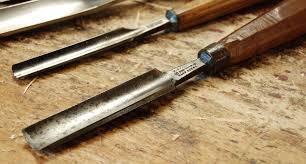
记忆方法
1. 谐音“沟沟、沟掘、高掘”。
中文词源
gouge 凿
来自拉丁语gulbia, 凿。可能进一步来自PIE*skel, 砍,切,词源同scale, coup. 字母l软化u.
英语词源
- gouge
-
gouge: [15] Gouge may be of Celtic origin – a resemblance to forms such as Welsh gylf ‘beak’ and Cornish gilb ‘borer’ has been noted. But its earliest positively identifiable ancestor is late Latin gubia, whose Old French descendant gouge was borrowed by English.
- gouge (n.)
- mid-14c., "chisel with a concave blade," from Old French gouge "a gouge" (14c.), from Late Latin gubia, alteration of gulbia "hollow beveled chisel," probably from Gaulish (compare Old Irish gulban "prick, prickle," Welsh gylfin "beak"). Meaning "an imposition, a cheat" is from 1845, American English colloquial.
- gouge (v.)
- 1560s, "to cut with a gouge," from gouge (n.). Meaning "to force out with a gouge" (especially of the eyes, in fighting) attested by 1800. Meaning "to swindle" is American English colloquial from 1826 (implied in plural noun gougers). Related: Gouged; gouging.
权威例句
- 1. He has accused her of threatening to gouge his eyes out.
- 他指控她曾威胁要挖出他的眼睛。
- 2. She reached up and tried to gouge her attacker's eyes.
- 她伸出手,想把攻击者的眼睛抠出来.
- 3. I wanted to gouge her eyes out.
- 我那时想把她的双眼挖出来.
- 4. To make a Halloween lantern, you first have to gouge out the inside of the pumpkin.
- 要做一个万圣节灯笼, 你先得挖空这个南瓜.
- 5. In the Middle Ages, a favourite punishment was to gouge out a prisoner's eyes.
- 在中世纪, 惩罚犯人最常用的办法是剜眼睛.
